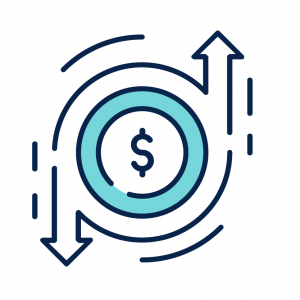Disclosure: Privacy Australia is community-supported. We may earn a commission when you buy a VPN through one of our links. Learn more.
Best Return on Investment – Shares, Bonds or Property?

We have entered an era when there is so much confusion in the markets that ‘capital at risk’ is a common slogan.
In such a period of flux, knowing what your return on investment is, in any concrete way, is no easy task. You have to base uour analysis on longer fundamental financial cycles that have occurred in the past.
Usually, a worldwide recession sees the stock markets and property markets plunge—but there are always hidden opportunities amid the wreckage… Let’s find out more about the return on investment for shares, bonds, and property.
Table of Contents:
At a Glance 📚: Best Return on Investment – Shares, Bonds or Property?
- This question gets into the philosophy of what’s most important to you.
- In the past, you could work a regular job and pay off a mortgage for a family home in a decade or so. Today, that same property costs x5 more but wages haven’t risen as quickly. However, that crazy property bubble may burst.
- Stocks and bonds are heavily dependent on the state of the economy.
- With Australian firms 🚀💥 obliterated by pandemic restrictions and then talk of a recession, the stability of the traditional markets is also in doubt.
Learn… ★ How to Hedge with Options
What is the ROI of Properties?
The first thing to note about real estate is that, despite the reassuring tactile quality of a “bricks and mortar” asset, the value of a house might not be as stable as the actual structure.
Nevertheless, it’s important to keep in mind that property markets can fluctuate and that, in rare instances, a home may lose much of its value. This can happen, for instance, if a region experiences a significant economic shock like the closing of a big source of employment.
But on a broader scale, house values are closely related to the state of the overall economy—and elements like general optimism, interest rates, and lending practices can have a significant influence.
- Property Guide 🏚️: What are REITs?
But what about a real estate investment’s ROI?
We can at least take a historical look at how the various investment types have performed—while keeping in mind the standard disclaimer that “past performance may not necessarily be a pointer to the future”.
In the financial sections of the popular press, you will frequently find comparisons between the growth in average house prices and an index, such as the FTSE100, or an analogous index for bonds. In general, they will demonstrate that real estate is a solid investment, superior to bonds, albeit less so than shares over the long run (20 years or more).
But in the opinion of some, these hypothetical returns are far different from what an actual investor would really see.
There are many more things to consider while investing in real estate. A property needs upkeep, such as “fixing the roof,” etc—additionally, if the property is a unit or a house, it must be insured, taxes must be paid, and service fees may be required.
When examining “average house” price changes, the overall improvement in the housing stock is a more subtle cost that is often not taken into consideration. If you purchased an “average house” in 1980, for example, it would clearly be “below average” now if you haven’t spent a substantial quantity of money updating the property—such as by remodelling the kitchen and bathroom, installing air con and other mod cones which people now expect when buying a property.
On the plus side, nobody would purchase a home and then leave it unoccupied for ten years. Homes can be rented out long-term or just for short periods of time to generate revenue (some AirBNB businesses are 🌞 multi-seven-figures).
This obviously needs to be factored into the overall return on your home investment. When attempting to accomplish this, there are several variables that might affect the results, including whether the rental is temporary or seasonal, the length of the season for summer, and so on.
Even though talk of recession seems to be subsiding, the market is crying out for hard resources. This means that manufacturing and commodities are in intense demand.
If your property happens to be fertile farmland or a homestead 🐄, this makes it a considerable asset regardless of which way the general economy moves.
You can more easily:
✔️ Grow your own food.
✔️ Sell your own food.
✔️ Weather supply shortages.
Did You Know? 💡: “2022 was the eighth consecutive year that the national median price per hectare of Australian farmland has increased, in which time it has risen by 123 per cent.”
Simon Dundon, Rural Bank General Manager – Source
What is the ROI of Stocks & Bonds?
Similar problems arise when looking at stocks and shares. In the financial markets, there are fees associated with buying and selling shares, and no-one can duplicate the results of an “index” for free because transaction fees in your trading app are necessary to follow an index.
There are management fees when purchasing a fund. However, compared to an investment in real estate, these impacts are overall far less significant.
Risk and unpredictability are other factors to take into account. We’ve learned from the past that real estate values may go down as well as up.
Despite the fact that an overheated real estate market was the cause of the financial crisis, stock market share prices fell more at the peak of the recession in 2008 than home prices did!
Back then, the best course of action would have been to put all of your funds in a liquid asset (which is obviously simple to say in hindsight!). Shares are typically seen to be more volatile than real estate, with fixed-income assets like bonds being even less risky (at the time!).
But things have changed yet again—with once-stable powers weakening and the old 🔱 emerging powers growing.
- Keep up to date with 📰 PA News…
Risk Appetite
But while analysing risk, you must take into consideration the fact that you don’t just go out and buy an “average property”; rather, you buy a specific one.
Therefore, how well you analyse the market, select a property, and negotiate the price during acquisition and sale will determine your return.
You must also consider the likelihood that an unforeseeable event, such as the construction of a new road or an improvement to an already desirable neighbourhood, might reduce the value of your home (of course these factors can go in your favour).
How Liquid?
The last thing to think about is liquidity. Initially, stocks are the most liquid, bonds the second-most, and real estate the least.
- Trading Guide 📕: What is the ASX?
In contrast to the majority of financial ventures, selling a property takes a long time and costs money. You also have the benefit of being able to make partial withdrawals with other assets, whereas selling a fourth of your property is far more difficult!
Of course, purchasing real estate involves both emotional and rational considerations. You can’t take a short vacation with your stock market share portfolio—therefore many individuals buy an Australian vacation property with the intention of utilising it personally and renting it out for a portion of the time.
However, what I’d suggest is approaching an investment in real estate like a startup firm; in other words;
- Carefully consider every cost, including taxes (such as property tax and capital gains tax), insurance, service fees, a reasonable upkeep budget, and purchase and sale transaction costs.
- Be realistic about the amount of rental revenue you may expect from the property, because you won’t always have tenants there.
- Determine how you will manage the tasks involved in managing the property, such as upkeep, conversions to a vacation rental, marketing and advertising, etc. This should not be undervalued if it is not close to your own residence.
- Calculate each tax impact, including income tax, capital gains tax, and so on.
Conclusion

Going back to the main question of this fairly lengthy research, which investment is the best?
Sadly, there isn’t a simple solution. According to historical data, stocks have done the best over the long run, followed by fixed-income assets, and then real estate.
But the normal relationship between risk and benefit still holds true; shares in stock markets have also been the most volatile. The only qualification I would make is that—due to the manner in which people engage in the real estate market by purchasing a single home—homeownership may be riskier than most analyses would indicate (somewhat analogous to investing in a single company rather than a basket of shares or an ETF).
You Might Also Like:






